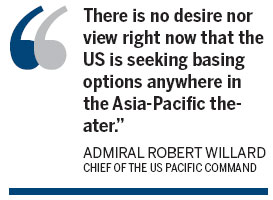Philippines sends 'wrong signal'
Updated: 2012-01-30 07:59
By Cui Haipei (China Daily)
|
||||||||
|
|
BEIJING - By allowing more US troops on its soil, the Philippines has sent the wrong signal, experts said, and the decision will cause more tension in the South China Sea.
China has taken note of the report and urges relevant parties to do more to help maintain regional peace and stability, the Foreign Ministry said in a statement on Sunday.
Foreign Secretary Albert del Rosario said last week in Manila that the Philippines was looking to conduct more joint exercises with the United States and have a greater number of US troops rotate through the Southeast Asian country.
Considering that it was a result of the second strategic defense dialogue between the two countries, the decision was an important step in upgrading the Philippines' bilateral relationship with the US since President Benigno Aquino took office in 2010, said Wang Junsheng, an expert on Asian studies at the Chinese Academy of Social Sciences.
The move sends a very dangerous signal that could cause China to misjudge the US' intentions, and raise suspicions between the two countries, Wang said. The US released its military budget last week, which indicated that $6 billion would be cut next year, reducing its ground forces by 100,000 troops, Wang added.
The Philippines also gets a "clear but wrong" message that the US supports a confrontation with China on the South China Sea, Wang said, adding that it might complicate the current situation in the area.
The offer comes two months after US President Barack Obama, on a visit to Australia, announced that the United States would send 2,500 Marines to the northern city of Darwin by 2016-17.
The United States also plans to deploy littoral combat ships in Singapore, a longtime US partner with a strategic position.
"No matter how strong the outside country is, it can not help the Philippines to achieve illegal sovereignty claims," said Peng Guangqian, a Beijing-based military strategist.
If Philippines-US military cooperation increases, the Philippines would pay a price on its sovereignty, he said. The Philippines is a former US colony, and it remains to be seen how far the cooperation will go, Peng added.
Admiral Robert Willard, chief of the US Pacific Command, said that the United States is not looking for more bases in the region beyond those for the more than 85,000 troops in Japan and South Korea.
"There is no desire nor view right now that the US is seeking basing options anywhere in the Asia-Pacific theater," he said at a news conference in Washington.
"Initiatives such as Australia offered or such as Singapore offered to allow us to rotate forces from locations that are closer and more adjacent to Southeast Asia afford Pacific Command the opportunity to more conveniently have its presence there and felt," he said.
The plan for a stronger US military presence in the region has been met with opposition in the Philippines.
On Saturday, some 50 members of Philippine leftist New Nationalist Alliance (Bayan) picketed the US embassy, vowing to launch a campaign opposing the plan to allow more US troops in the country. They held a huge effigy of Uncle Sam with another of President Aquino labeled as his "dog", and riot police prevented them approaching the mission.
"If we allow more US troops to enter our country, the entire archipelago will be transformed into one military outpost for US hegemonic interests," Bayan said in a statement distributed at the rally.
AFP contributed to this story.
China Daily

 Relief reaches isolated village
Relief reaches isolated village
 Rainfall poses new threats to quake-hit region
Rainfall poses new threats to quake-hit region
 Funerals begin for Boston bombing victims
Funerals begin for Boston bombing victims
 Quake takeaway from China's Air Force
Quake takeaway from China's Air Force
 Obama celebrates young inventors at science fair
Obama celebrates young inventors at science fair
 Earth Day marked around the world
Earth Day marked around the world
 Volunteer team helping students find sense of normalcy
Volunteer team helping students find sense of normalcy
 Ethnic groups quick to join rescue efforts
Ethnic groups quick to join rescue efforts
Most Viewed
Editor's Picks

|

|

|

|

|

|
Today's Top News
Health new priority for quake zone
Xi meets US top military officer
Japan's boats driven out of Diaoyu
China mulls online shopping legislation
Bird flu death toll rises to 22
Putin appoints new ambassador to China
Japanese ships blocked from Diaoyu Islands
Inspired by Guan, more Chinese pick up golf
US Weekly

|

|







